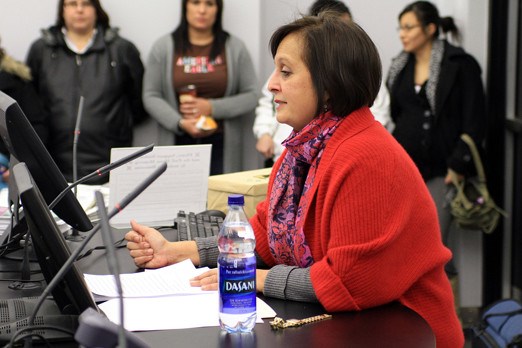Sherene Razack says Canadians are practicing a slow form of genocide against its Aboriginal peoples.
Noting there are at least 580 missing and presumed murdered Aboriginal women in Canada and dozens of deaths of Aboriginal men in custody, the University of Toronto sociology professor was at Lakehead University arguing that those who colonized the New World are at fault.
Just because it’s not on the scale of Rwanda or the Balkans, doesn’t mean the label doesn’t fit, Razack said.
“When we think of genocide we think of these kind of spectacular historical examples and we don’t think of slow death. And that is what this is,” Razack said. “The discomfort people have around it is we also need to think of Aboriginal communities as thriving communities, as people who are fighting back and surviving and existing.
“And that’s very hard to do when you use the word genocide.”
Razack suggested that instead of creating a society that welcomes everyone, First Nations people have been sent to the fringes, told they can live on remote reserves or brought to Canadian cities where there’s little in the way of proper support to help them find their way in a modern, European-based society.
The connection, in many cases, just isn’t there, she said.
“This is a white settler’s society, this is a colonial society. And in colonial societies, the colonized, the people whose land we’ve taken, are tremendously dehumanized,” she said in a pre-speech interview.
“One expression of that dehumanization is that they encounter more violence, daily violence, from individuals, from police, from a number of places. The land, we should remember, is still being stolen, so it is necessary to assert a sort of racial superiority against the people whose lands you’ve taken.”
Razack said the evidence is everywhere, and pointed to the murder of 28-year-old Pamela George, a part-time Regina prostitute killed by two white university students.
Razack detailed the trial results, which saw the two men convicted of murder, but only sentenced to six-and-a-half years. She said it was a prime example of how violence against Aboriginal women is not taken seriously by the Canadian legal system.
The judge and jury didn’t take into consideration that she was a loving mother of two children, cared for her alcoholic father and loved to cook.
All they saw was a woman who sold herself occasionally to make ends meet.
“What you learn from the trial is that she was an Indian. And that’s all over the transcript,” Razack said.
It’s as if the judge and jury were saying, “She knew what she was doing was risky work,” she added.
Razack said she thinks it’s deeply ingrained in the Canadian psyche to consider Aboriginal people as less than other people, and that while this attitude is often subconscious, it’s supported everywhere.
It’s much more than prejudice, she said, calling it an attack.
“One of the first things we have to do is to stop it from happening and treat it as the crisis it is. As for education, of course we can do anti-colonial education, but education will only go so far. Children see in society that Aboriginal people are murdered, and not many people care,” she said.
The violence is relentless and crosses all sectors, Rezack added, noting the UN has indicted Canada for failing to recognize the crisis within its borders.
After doing so, then strategies to right the problem must follow.
“Those strategies have to start with the fact this is happening massively to Aboriginal people. It happens to other groups as well. Certainly no woman is safe, but we need to understand that and tailor the strategies to that,” she said.
Land, however, is the compelling reason to ignore the violence, pretend it’s not happening – at least not in any great multitude.
“We need to understand Aboriginal people as either dead, dying or dysfunctional. That way we don’t have to think about the fact that it is their land and we have systematically starved them and impoverished them, and so on.”
Razack will give a second speech, focusing on the plight of Aboriginal men in the penal system, on Friday evening.
The afternoon talk was also a fundraiser for the Stolen Sisters Full Moon Memory Walk, an annual event to raise awareness for missing Aboriginal women.
